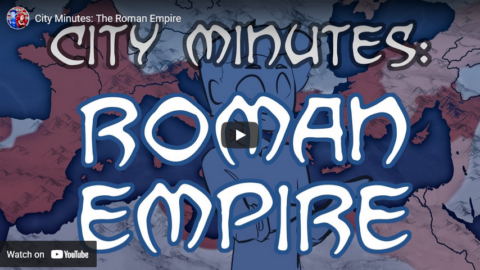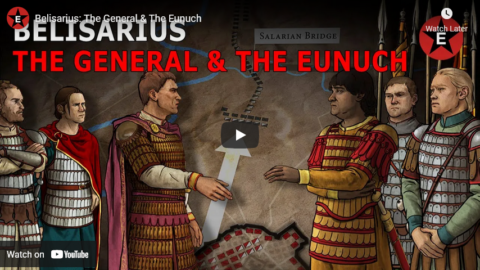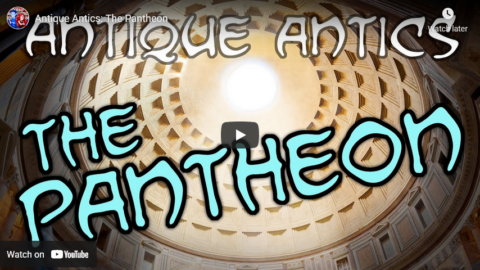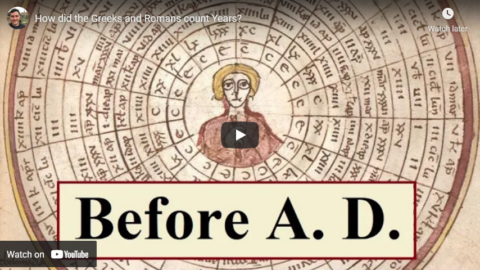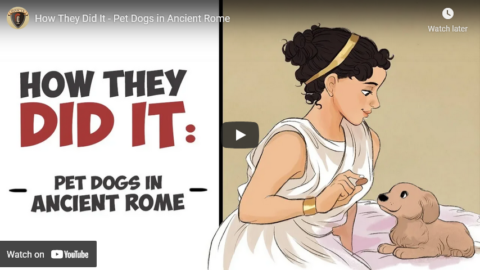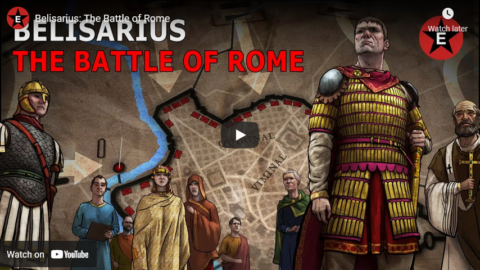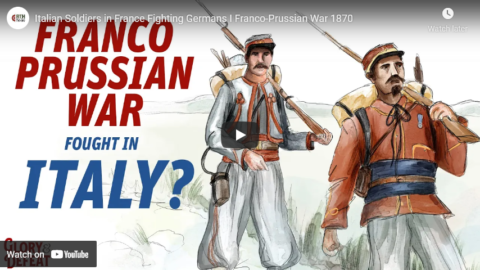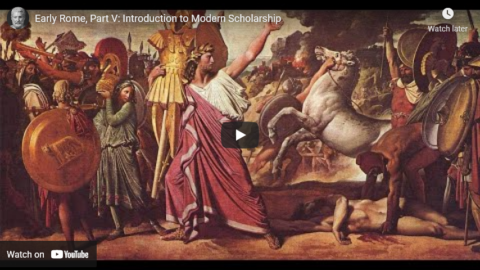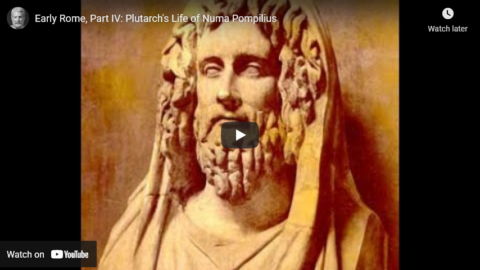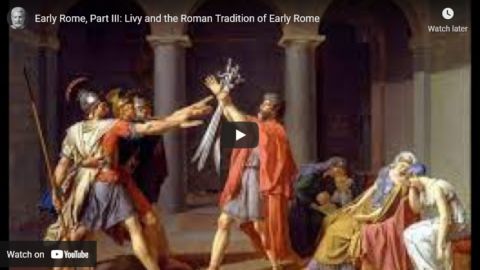Overly Sarcastic Productions
Published 4 Feb 2022The funny thing about Empire is that ~*Rome*~ includes far more than just the City of Rome. Spread out across every corner of the Mediterranean — and then some — Roman Civilization was always adapting to local circumstances and changing over time. Today we’ll look at 5 cities that show the diversity of just how much “Rome” could really mean in the days of the empire.
The Great Cities In History by John Julius Norwich, “A Wonder of the World – Ephesus” from The Great Tours: Greece and Turkey, from Athens to Istanbul by John R. Hale, “Ephesus”, “Leptis Magna”, “Roman Britain”, “Pompeii” from World History Encyclopedia https://www.worldhistory.org/ephesos/, https://www.worldhistory.org/Lepcis_Magna, https://www.worldhistory.org/Roman_Britain, https://www.worldhistory.org/pompeii/. “Ephesus”, “Leptis Magna” “London”, “Pompeii” from Britannica https://www.britannica.com/place/Ephesus, https://www.britannica.com/place/Leptis-Magna, https://www.britannica.com/place/Lond…, https://www.britannica.com/place/Pompeii. I also have a degree in Classical Studies.
Chapters:
0:00 — Rome
0:58 — Ephesus
2:00 — Leptis Magna
3:03 — Londinium
4:12 — Pompeii
5:17 — ConclusionOur content is intended for teenage audiences and up.
PATREON: https://www.Patreon.com/OSP
PODCAST: https://overlysarcasticpodcast.transi…
DISCORD: https://discord.gg/osp
MERCH LINKS: http://rdbl.co/osp
OUR WEBSITE: https://www.OverlySarcasticProductions.com
Find us on Twitter https://www.Twitter.com/OSPYouTube
Find us on Reddit https://www.Reddit.com/r/OSP/
February 5, 2022
City Minutes: The Roman Empire
January 22, 2022
Belisarius: The General & The Eunuch
Epic History TV
Published 21 Jan 2022Download Fishing Clash for FREE and play today! https://fishingclash.onelink.me/dkOM/…
Big thanks to Legendarian for Total War: Attila gameplay footage, check out his YouTube channel here: https://www.youtube.com/channel/UCOI2…
Big thanks also to our series consultant Professor David Parnell of Indiana University Northwest, who you can follow on Twitter here: https://twitter.com/byzantineprof
Total War: Attila gameplay footage used with kind permission of Creative Assembly – buy the game here: https://geni.us/qDreR
Support Epic History TV on Patreon from $1 per video, and get perks including ad-free early access & votes on future topics https://www.patreon.com/EpicHistoryTV
🎨 Original artwork by Miłek Jakubiec https://www.artstation.com/milek
📚 Recommended reading (as an Amazon Associate I earn from qualifying purchases):
📖 Procopius, History of the Wars https://geni.us/L3Pgc
📖 The Wars of Justinian by Michael Whitby https://geni.us/Xxrd3
📖 Rome Resurgent by Peter Heather https://geni.us/ZFoU1
📖 The Armies of Ancient Persia: the Sassanians by Kaveh Farrokh https://geni.us/jMQo3z
📖 Late Roman Cavalryman AD 236–565 (Osprey) by Simon MacDowall https://geni.us/XMGl👕 Buy EHTV t-shirts, hoodies, mugs and stickers here! teespring.com/en-GB/stores/epic-histo…
🎶 Music from Filmstro: https://filmstro.com/?ref=7765
Get 20% off an annual license with this exclusive code:EPICHISTORYTV_ANN#EpicHistoryTV #RomanEmpire #EasternRomanEmpire #Justinian #Belisarius #ByzantineEmpire #Romans #Ostrogoths
January 8, 2022
Antique Antics: The Pantheon
Overly Sarcastic Productions
Published 7 Jan 2022It’s a good dome, simple as that.
SOURCES & Further Reading: The Great Courses lectures: “The Most Celebrated Edifice – The Pantheon” from Understanding Greek and Roman Technology by Stephen Ressler, and “Roman Art and Architecture” from The Roman Empire: From Augustus to The Fall of Rome by Gregory Aldrete. “The Pantheon” by Chris Legare via ATouchOfRome https://www.atouchofrome.com/the_pant…. Additionally, I have a university degree in Classical Studies.
Our content is intended for teenage audiences and up.
PATREON: https://www.Patreon.com/OSP
PODCAST: https://overlysarcasticpodcast.transi…
DISCORD: https://discord.gg/osp
MERCH LINKS: http://rdbl.co/osp
OUR WEBSITE: https://www.OverlySarcasticProductions.com
Find us on Twitter https://www.Twitter.com/OSPYouTube
Find us on Reddit https://www.Reddit.com/r/OSP/
January 3, 2022
How did the Greeks and Romans count Years?
toldinstone
Published 31 Dec 2021The AD/CE system we use to date the year was introduced — more or less by accident — during the Middle Ages. Before its invention, the classical world used a wide range of dating systems.
Please consider supporting this channel on Patreon:
https://www.patreon.com/toldinstoneIf you liked this video, you might also enjoy my book Naked Statues, Fat Gladiators, and War Elephants: Frequently Asked Questions about the Ancient Greeks and Romans:
https://www.amazon.com/Naked-Statues-…
If you’re so inclined, you can follow me elsewhere on the web:
https://www.reddit.com/r/AskHistorian…
https://www.instagram.com/toldinstone/
https://www.goodreads.com/author/show…Chapters:
0:00 Introduction
0:51 Ancient Greek Calendars
1:42 Counting by Olympiads
2:22 The Seleucid Era
2:56 Consular Dating
3:26 Ab Urbe Condita
4:28 Indictions
4:56 Christian Chronology
5:40 Anno Domini
7:00 Conclusion
December 27, 2021
Celebrating Saturnalia with Cato’s Globi
Tasting History with Max Miller
Published 15 Dec 2020Help Support the Channel with Patreon: https://www.patreon.com/tastinghistory
Tasting History Merchandise: crowdmade.com/collections/tastinghistoryFollow Tasting History here:
Instagram: https://www.instagram.com/tastinghist…
Twitter: https://twitter.com/TastingHistory1
Reddit: r/TastingHistory
Discord: https://discord.gg/d7nbEpyLINKS TO INGREDIENTS & EQUIPMENT**
Canon EOS M50 Camera: https://amzn.to/3amjvwu
Canon EF 50mm Lens: https://amzn.to/3iCrkB8
Safflower Oil: https://amzn.to/39Lcsiz
Spelt Flour: https://amzn.to/3ggzPBO
Poppy Seeds: https://amzn.to/37DyG3q
Pokemon plushie: www.pokemoncenter.comLINKS TO SOURCES**
De Agricultura by Cato the Elder: https://amzn.to/3qxL5P5
Saturnalia by Macrobius: https://amzn.to/39N6Pkb
The Twelve Ceasars by Seutonius: https://amzn.to/39MQBat
**Amazon offers a small commission on products sold through their affiliate links, so each purchase made from this link, whether this product or another, will help to support this channel with no additional cost to you.Subtitles: Jose Mendoza
GLOBI
ORIGINAL 2ND CENTURY BC RECIPE (From De Agricultura by Cato the Elder)
Globi to be made thus: Mix the cheese and spelt in the same way. Make as many as desired. Pour fat into a hot copper vessel, and fry one or two at a time, turning them frequently with two sticks, and remove when done. Coat with honey, sprinkle with poppy-seeds, and serve.MODERN RECIPE
INGREDIENTS
– 1 Cup (240g) Ricotta Cheese
– 1 Cup and 1 tablespoon (120g) Spelt, Durum or other whole grain flour
– 1 Quart (1 L) of fat or oil
– 1/3 Cup (80ml) Honey
– Poppy SeedsMETHOD
1. Mix the cheese and flour in a large bowl, then form it into balls about 1 inch across. This recipe should make 12-15 balls.
2. Heat the oil over a high heat until it reaches 350°F (175°C). Turn heat to medium and fry two to three balls at a time, turning every 10 to 15 seconds with tongs. At 60 seconds, begin to check the color; once they are a golden brown (60-90 seconds) take them out and set them on a wire rack over paper towels to drain. Repeat until all of the globi are fried.
3. Dip the dried globi in honey (heating the honey can help if it is too thick). Then sprinkle with poppy seeds and serve.PHOTO CREDITS
Saturn: By inconnu – User:Jean-Pol GRANDMONT (2011), CC BY 3.0, https://bit.ly/39OKgLF
A Statue of Chronos: By Rufus46 – Own work, CC BY-SA 3.0, https://bit.ly/3giv9eH
Pileus: By Marie-Lan Nguyen (2009), CC BY 2.5, https://bit.ly/3osYo1l
Roman Collared Slaves: Ashmolean Museum, CC BY-SA 2.0 https://bit.ly/36OoIgz
Candles Oberflacht: Landesmuseum Württemberg, CC BY-SA 3.0 https://bit.ly/2Lf9yZp
Roman Figurines: Carole Raddato from FRANKFURT, Germany, CC BY-SA 2.0 https://creativecommons.org/licenses/…#tastinghistory #saturnalia #globi #romancooking
December 18, 2021
Saturnalia
Historia Civilis
Published 17 Dec 2016Io, Saturnalia!
Patreon | http://historiacivilis.com/patreon
Donate | http://historiacivilis.com/donate
Merch | http://historiacivilis.com/merch
Mailing List | http://historiacivilis.com/mailinglist
Twitter | http://historiacivilis.com/twitter
Website | http://historiacivilis.comMusic is:
“I //\\ I,” by Discount Fireworks
December 12, 2021
How They Did It – Pet Dogs in Ancient Rome
Invicta
Published 12 Sep 2018Our history with man’s best friend stretches far into the past. Today we take a look at the lives of dogs in ancient Rome; how they named, trained, and raised them.
Bibliography:
Xenophon and Arrian: On Hunting (1999) translated by A. A. Phillips and M. M. Willcock
Metamorphoses Book III by Ovid
Names of Dogs in Ancient Greece by Adrienne Mayor
Greek and Roman Household Pets by Francis D. LazenbyArtwork:
Beverly Johnson (https://www.behance.net/bevsi)Music:
“Strings and Drums Comedy” by 8th Mode Music
“Emotional” by 8th Mode Music#RomanHistory
#HowTheyDidIt
December 11, 2021
Belisarius: The Battle of Rome
Epic History TV
Published 10 Dec 2021Thank you to our sponsor Private Internet Access.
Get the Epic History TV special offer using this link: https://www.privateinternetaccess.com…Big thanks to Legendarian for Total War: Attila gameplay footage, check out his YouTube channel here: https://www.youtube.com/channel/UCOI2…
Thanks also to our series consultant Professor David Parnell of Indiana University Northwest, who you can follow on Twitter here: https://twitter.com/byzantineprof
Total War: Attila gameplay footage used with kind permission of Creative Assembly — buy the game here: https://geni.us/qDreR
Support Epic History TV on Patreon from $1 per video, and get perks including ad-free early access & votes on future topics https://www.patreon.com/EpicHistoryTV
🎨 Original artwork by Miłek Jakubiec https://www.artstation.com/milek
📚Recommended reading (as an Amazon Associate I earn from qualifying purchases):
📖 Procopius, History of the Wars https://geni.us/L3Pgc
📖 The Wars of Justinian by Michael Whitby https://geni.us/Xxrd3
📖 Rome Resurgent by Peter Heather https://geni.us/ZFoU1
📖 The Armies of Ancient Persia: the Sassanians by Kaveh Farrokh https://geni.us/jMQo3z
📖 Late Roman Cavalryman AD 236–565 (Osprey) by Simon MacDowall https://geni.us/XMGl👕 Buy EHTV t-shirts, hoodies, mugs and stickers here! teespring.com/en-GB/stores/epic-histo…
🎶Music from Filmstro: https://filmstro.com/?ref=7765
Get 20% off an annual license with this exclusive code:EPICHISTORYTV_ANN#EpicHistoryTV #RomanEmpire #EasternRomanEmpire #Justinian #Belisarius #ByzantineEmpire #Romans
December 2, 2021
QotD: The quickening pace of change
One of the toughest things to get across to History students is the pace of change. Students hate it, but the “memorize this list of dates” approach actually helps — one can’t help but notice that your list of “the 20 most significant dates” for, say, the medieval period covers a millennium, while that same list for the Roman Empire covers maybe a century. Even there, though, most people could be forgiven for mistaking 50 AD for 150 AD, or even 250 AD (even archaeologists generally consider it a success if they can date something to within a century, I’m told).
But nobody would mistake 1790 for 1890, let alone 1990. A Roman of the late Republic (100 BC) could still get around ok if you time-warped him into the late Empire (300 AD). Time warp a guy from 1790 into 1890, though, and he’d think he was on Mars. (Zap him into 1990, and he’d think he’d died and gone to Hell). The pace of change accelerated exponentially starting in about 1400; by the Industrial Era it was a blur.
Which is why I’m terrified right now. We feel like change is happening at light speed. As a Historian, I can promise you — it’s at least Warp 6, and the dilithium crystals are nowhere near to overloading.
Severian, “Faster and Faster”, Rotten Chestnuts, 2019-02-01.
November 1, 2021
QotD: Latin
Any English speaker who calls Latin easy is either a genius or a fool. It is a synthetic Indo-European language that communicates in ways very different from English. Nouns are divided into at least five classes, each of which has five or six or seven cases – singular and plural – to express meanings that we express by adding prepositions. Pronouns have their own declensions. Except for the perfect passive tenses, verbs are generally inflected. Because the Classical grammar is a snapshot of a language in rapid and profound change, there are duplications and irregularities everywhere. The future tense, in particular, is broken, and has been reconstructed in every language I know that descends from Latin. Add to this an elaborate syntax, an indifference to what we regard as a normal order of words, and a vocabulary that is naturally poor, but expanded by allowing most common words to bear different meanings that must usually be inferred from their context.
This being said, anyone who denies the language is worth learning is a barbarian who deserves to live in the illiterate swamp that we nowadays call civilisation. Without denying the importance of the Greeks, Rome stands at the origin of our literature and law and religion. Latin was, until the late seventeenth century, the normal language of learning and international communication. Directly or indirectly, Latin has given English around sixty per cent of its words. I am not sure if anyone can write English well who is ignorant of Latin. I do not believe anyone can appreciate or notice the full register of our own classical literature without some knowledge of Latin. A further point is that, even today, a qualification in Latin is taken as proof of general intelligence. In short, Latin is a struggle, but a struggle worth undertaking.
Sean Gabb, “A Review of Latin Stories (2018)”, Sean Gabb, 2018-12-23.
October 12, 2021
QotD: Titus Livius, better known as Livy
Livy’s life (roughly 59 BC to about 17 AD) spanned the most consequential period in the thousand-year history of ancient Rome. He witnessed the last decades of the crumbling old Republic and the rise in its place of the imperial autocracy we know as the Roman Empire. He was in his early twenties when the last great defender of the republican heritage, Cicero, was assassinated by a henchman of the tyrant Marc Antony. Livy observed the entirety of the reign of the first Emperor, Augustus. He is best known for his history of Rome, Ab Urbe Condita, described both in his day and in ours with such terms as “monumental” and “magisterial”.
What little we know of the man himself suggests he was somehow financially well-off, independent, and reclusive. He was schooled in rhetoric, philosophy, and history. He never served in any public position, though apparently, he personally knew Augustus. Writing his massive history of Rome absorbed his adult life.
Though Romans at the time of his writing held his work in high regard, we know that some parts of Livy’s historical accounts were surely based on minimal records, old and dubious oral stories, and even legend. After all, he wrote 2,000 years ago about people and events of as much as eight centuries before his time. “I hope my passion for Rome’s past has not impaired my judgment,” he opined in his introduction to Ab Urbe Condita, “for I do honestly believe that no country has ever been greater or purer than ours or richer in good citizens and noble deeds.”
“The old Romans,” wrote Livy of his countrymen before the beginning of the Republic, “all wished to have a king over them because they had not yet tasted the sweetness of freedom.” But then in 508 BC, Romans mounted a truly historic revolution of both ideas and governance. They overthrew the monarchy and established a new order that ultimately included a Senate of nobles, popularly elected Assemblies, the dispersion of centralized power, term limits, a constitution, due process, habeas corpus, and the widest practice of individual liberty the world had yet seen. Before they lost it all less than five centuries later, they experienced a remarkable rise and fall. […]
From Livy, we learn about Rome’s pivotal wars against the Carthaginians, the Samnites, and other peoples of the Italian Peninsula. He also informs us of the rivalry between Sulla and Marius, the tumultuous last days of the Republic as strong men fought each other for power, the murder of Julius Caesar, and the self-serving machinations of Augustus. Livy celebrated the courage of his ancestors; in fact, he originated the phrase, “Fortune favors the brave,” which is still used commonly today as a maxim and a motto.
Lawrence W. Reed, “Lessons from Livy on How Great Civilizations Rise and Fall”, Foundation for Economic Education, 2021-06-28.
September 24, 2021
Italian Soldiers in France Fighting Germans I Franco-Prussian War 1870
Real Time History
Published 23 Sep 2021Sign up for Curiosity Stream and get Nebula bundled in and SAVE 26%: https://curiositystream.com/realtimehistory
While the Franco-Prussian War was raging in France, another armed conflict to the south was reaching its conclusion. The unification of Italy was not yet complete in the eyes of Italian nationalists because Rome and the Papal State still held out. After the defeat at Rome, the Papal Zouaves went on to France to fight the Prussians.
» THANK YOU TO OUR CO-PRODUCERS
John Ozment
James Darcangelo
Jacob Carter Landt
Thomas Brendan» OUR PODCAST
https://realtimehistory.net/podcast – interviews with historians and background info for the show.» LITERATURE
Arand, Tobias: 1870/71. Die Geschichte des Deutsch-Französischen Krieges erzählt in Einzelschicksalen. Hamburg 1870Bunnenberg, Christian: “Granaten sammeln. Totenkult und Tourismus auf den Schlachtfeldern”, in: 1870/71 – Der deutsch-französische Krieg und die Gründung des Kaiserreiches, ZEITGeschichte 4 (2020), S. 97.
Fiori, Simonetta: “Porta Pia. Roma libera e italiana”, in: La Repubblica v. 19.9.2020. o. S.
Pilant Paul: “La population messine pendant le siège de 1870”. In: La Révolution de 1848 et les révolutions du XIXe siècle, Tome 33, Numéro 158, Septembre-octobre-novembre 1936. pp. 141-175.
Plessner, Helmuth: Die verspätete Nation. Über die politische Verführbarkeit bürgerlichen Geistes. Kohlhammer, Stuttgart 1959
Seibt, Gustav: Rom oder Tod. Der Kampf um die italienische Hauptstadt. Berlin 2001
» SOURCES
Bazaine, François Achille: L’Armée du Rhin depuis 12. Août jusqu’ au 29. Octobre 1870. Paris 1872Braun, Lily (Hrsg.): Kriegsbriefe aus den Jahren 1870/71 von Hans v. Kretschman. Berlin 1911
Crombrugghe, Ida de: Journal d’une infirmière. Paris 1871
» OUR STORE
Website: https://realtimehistory.net»CREDITS
Presented by: Jesse Alexander
Written by: Cathérine Pfauth, Prof. Dr. Tobias Arand, Jesse Alexander
Director: Toni Steller & Florian Wittig
Director of Photography: Toni Steller
Sound: Above Zero
Editing: Toni Steller
Motion Design: Philipp Appelt
Mixing, Mastering & Sound Design: http://above-zero.com
Maps: Battlefield Design
Research by: Cathérine Pfauth, Prof. Dr. Tobias Arand
Fact checking: Cathérine Pfauth, Prof. Dr. Tobias ArandChannel Design: Battlefield Design
Contains licensed material by getty images
All rights reserved – Real Time History GmbH 2021
September 21, 2021
Early Rome, Part V: Introduction to Modern Scholarship
Thersites the Historian
Published 6 Sep 2021In this video, we look at what modern scholars tend to think about early Rome and some of the ways in which they approach this fraught topic.
Patreon link: https://www.patreon.com/thersites
PayPal link: paypal.me/thersites
Discord: https://discord.gg/QCaXXFr
Brave Browser: https://brave.com/noa557
Twitter link: https://twitter.com/ThersitesAthens
Minds.com link: https://www.minds.com/ThersitestheHis…
Steemit/dtube link: https://steemit.com/@thersites/feed
BitChute: https://www.bitchute.com/channel/jbyg…
September 13, 2021
Early Rome, Part IV: Plutarch’s Life of Numa Pompilius
Thersites the Historian
Published 5 Sep 2021In this video, we look at how the philosopher Plutarch dealt with early Rome when he covered the life and times of Numa Pompilius, the most significant of Rome’s cultural heroes.
Patreon link: https://www.patreon.com/thersites
PayPal link: paypal.me/thersites
Discord: https://discord.gg/QCaXXFr
Brave Browser: https://brave.com/noa557
Twitter link: https://twitter.com/ThersitesAthens
Minds.com link: https://www.minds.com/ThersitestheHis…
Steemit/dtube link: https://steemit.com/@thersites/feed
BitChute: https://www.bitchute.com/channel/jbyg…
September 12, 2021
Early Rome, Part III: Livy and the Roman Tradition of Early Rome
Thersites the Historian
Published 5 Sep 2021Here, I examine Livy’s Book I with an emphasis on the tradition that he worked in and his agenda for undertaking such a massive and ambitious project.
Patreon link: https://www.patreon.com/thersites
PayPal link: paypal.me/thersites
Discord: https://discord.gg/QCaXXFr
Brave Browser: https://brave.com/noa557
Twitter link: https://twitter.com/ThersitesAthens
Minds.com link: https://www.minds.com/ThersitestheHis…
Steemit/dtube link: https://steemit.com/@thersites/feed
BitChute: https://www.bitchute.com/channel/jbyg…

